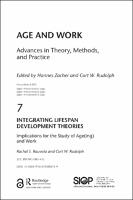Chapter 7 Integrating Lifespan Development Theories
Proposal review
Implications for the Study of Age(ing) and Work
Author(s)
Rauvola, Rachel S.
Rudolph, Cort W.
Language
EnglishAbstract
"Research on age(ing) and work often draws upon lifespan development perspectives to explain how adults “age successfully,” managing developmental gains and losses and maintaining well-being and functioning over time. There are a multitude of similar theories to consider to this end, which is both a blessing and a curse for researchers. In this chapter, we introduce a conceptual integration of predominant lifespan theories used in work and aging research, organized in terms of overlapping mechanisms, predictions, and guiding principles. Then, we present the specific aspects and core characteristics of commonly used lifespan development theories, particularly those related to our integration. We conclude with recommendations for applying our integration to new research areas and approaches in the work context, highlighting the ways in which more synthesis and codification can mutually improve the study of age(ing) and work.
"
Book
Age and WorkKeywords
organizational research; SIOP; SIOP Organizational Frontiers; SIOP Organizational Frontiers Series; organizational frontiers; organizations; Society for Industrial and Organizational Psychology; I/O psychology; organizational psychology; big data; data analysis; research methods; organizational sciences; data; data collection; data analysis, deevelopmental self-regulation, lifespan development, motivation, goals, well-being, successful agingDOI
10.4324/9781003089674-9ISBN
9780367545543, 9780367545536, 9781003089674Publisher
Taylor & FrancisPublisher website
https://taylorandfrancis.com/Publication date and place
2022Imprint
RoutledgeClassification
Organizational theory and behaviour
Psychology
Occupational and industrial psychology


 Download
Download